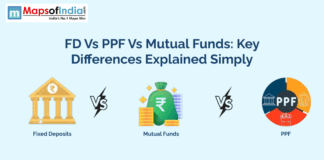 According to a report by the Associated Chambers of Commerce and Industry of India (ASSOCHAM) and PricewaterhouseCoopers (PwC), the Indian e-commerce industry is currently estimated to be worth around USD 17 billion. This comes as a surprise since most previous reports had suggested that Indian e-commerce industry to be valued around this figure by the end of 2019 only. The report also says that the industry may expect a compounded annual growth rate (CAGR) of about 35 percent, taking up its value to about USD 100 billion by 2020. Estimates suggest that about 65 million Indians now shop online – a rise of about 15 million from last year’s estimates. Each individual is willing to spend at least INR 10,000 a year on online purchases. While e-commerce still looks nascent in India, the phenomenal growth of giants such as Amazon, Flipkart, Snapdeal, Myntra, etc. is a proof that the Indian buyer is exploiting the e-commerce like never before.
According to a report by the Associated Chambers of Commerce and Industry of India (ASSOCHAM) and PricewaterhouseCoopers (PwC), the Indian e-commerce industry is currently estimated to be worth around USD 17 billion. This comes as a surprise since most previous reports had suggested that Indian e-commerce industry to be valued around this figure by the end of 2019 only. The report also says that the industry may expect a compounded annual growth rate (CAGR) of about 35 percent, taking up its value to about USD 100 billion by 2020. Estimates suggest that about 65 million Indians now shop online – a rise of about 15 million from last year’s estimates. Each individual is willing to spend at least INR 10,000 a year on online purchases. While e-commerce still looks nascent in India, the phenomenal growth of giants such as Amazon, Flipkart, Snapdeal, Myntra, etc. is a proof that the Indian buyer is exploiting the e-commerce like never before.
Traditional Businesses – Where Are They Headed?
In 2011, when Google Chrome launched its “The web is what you make of it” advertisement, demonstrating the transition of traditional art shops into e-commerce stores, a number of small businesses across the country sat up and took a note of it. About four years later, the numbers of small and large businesses that are using the internet to connect to their customers have grown manifold. The emergence of e-commerce platforms, such as Shopify, easily allow small and medium sized businesses to get an online presence and sell through social media networks such as Facebook, etc. While traditional retailers have been known to lodge protests against their eroding customer base from time to time, it is quite clear that e-commerce is the future of most enterprises.
Unfair Business Practices
With such booming growth however, the e-commerce industry of India is getting increasingly beleaguered by the lack of compliance with cyber laws and business regulations, and by unfair business practices in the cyber world. Instances of violation of Indian laws by online businesses are surfacing across the nation. While the titans of the industry such as Flipkart and Myntra are increasingly feeling the pressure from the regulatory authorities, India’s real concern lies elsewhere. For instance, online pharmacies offer to ship drugs across the country; telehealth centres are easily accessible online, and gaming sites allow Indians to gamble freely. Cyber security norms are routinely flouted by Bitcoin exchanges, encryption businesses, and online payment gateways. Cyber laws are flouted even by the well-known internet-based companies. A report from last year suggested that despite the online retail boom, online travel in India accounted for about 70 percent of the e-commerce industry. Online travel in the country clocked a CAGR of about 32 percent between 2009 and 2013. Not much regulation and policing exists in such niche areas of the country’s e-commerce industry, leading to many unfair business practices.
Latest Developments to Regulate E-Commerce Industry
The government of India has now started to feel the need to put up stringent regulations in the e-commerce industry. The Ministry of Consumer Affairs has come up with a draft note assigning responsibility to various departments to oversee various aspects of the industry.
The Committee of Secretaries (COS) has sought approval to earmark nine different government departments to regulate and handle the different areas related to e-commerce and online businesses. Tax evasion and tax-related concerns will be overseen by the Department of Revenue, while all concerns centered on foreign exchange and banking will be handled by the Reserve Bank of India. All complaints and concerns regarding unfair business practices, competition policy, and predatory pricing will be looked into by the Ministry of Corporate Affairs. Criminal frauds will be looked into jointly by the Finance Ministry, Home Ministry, and Ministry for Corporate Affairs. Policy matters with regard to foreign direct investment (FDI) and trade policy in e-commerce will be handled by the Department of Industrial Policy and Promotion (Ministry of Commerce and Industry). One of the major concerns of the industry is the lack of data protection. Cyber security is likely to come under the purview of the Department of Electronics and Information Technology. The Ministry of Information and Broadcasting will regulate the online advertising areas, while the Ministry of Consumer Affairs will directly handle all consumer grievances. Some other policy matters have been assigned to the Department of Consumer Affairs. The Statistics Department will be responsible for maintaining the sector’s data and information.
Standardisation of e-commerce rules, regulations, and guidelines shall become increasingly important in the days to come. What shall come out of this COS draft and when, is yet to be seen, but what remains undeniable is India’s urgent need for a regulatory umbrella in the e-commerce industry.





